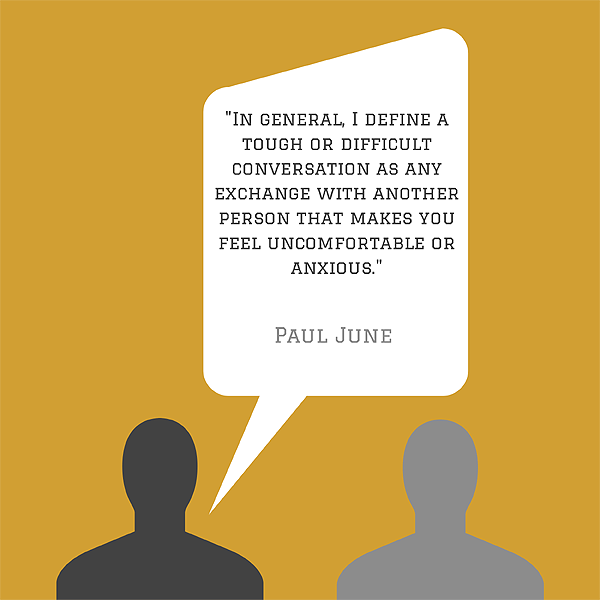One of the things I’ve learned in my career as a Marketing and Product Development Executive and Entrepreneur is that difficult conversations are often necessary and productive.
I don’t know about you, but when I hear the phrase “difficult conversations” the first things that spring to mind are images of people arguing and going away with hurt feelings. That should never happen. The key is focusing on conversation, which infers a meaningful exchange of dialogue. Arguments are hardly ever about that—they’re more about who can speak loudest or toss out the most hurtful barbs. Conversations, on the other hand, are all about articulating a position, listening for and hearing feedback, and responding to what you’ve heard. They are constructive exchanges (at least they should be).
As adults, we’d all like to think we’ve got this “difficult conversation” thing licked, that we’re not about to avoid saying what needs saying, and that we can do so in a constructive, civil, and gracious manner. We may be adults, but we’re still people, and with that comes emotions and fears—all of which can be overcome with the proper mindset about difficult conversations.
About 18 months ago, I wrote a blog on the topic, complete with some handy tips on how you and a colleague, loved one, family member, or even a complete stranger can engage in a difficult—yet constructive—conversation. Enjoy!
Tough Conversations Can Be Difficult—Even Fierce—But They’re Worth It
(Originally posted on March 27, 2013)
It’s easy to tell people what they want to hear. After all, politicians do it all the time (sorry, I couldn’t resist!). But what about what people need to hear, whether it’s good news or bad, or something in-between? What about those “tough” conversations, which some might even call “fierce”?

I don’t know anybody who enjoys a tough conversation, whether you’re the originator or the recipient of one. Most of us seem to go out of our way to avoid them. Maybe we’re hoping issues will resolve themselves or simply go away if left alone long enough; maybe we’re embarrassed that circumstances have led us to the point where a “fierce” conversation is necessary; or maybe we’re simply uncomfortable speaking frankly with a friend, loved one, or business associate. We fear we’ll make matters worse or tarnish a relationship that’s important to us . . . or simply don’t know where (or how) to start.
Of course avoidance never really works. Avoidance tends to make issues fester, expand, and grow far worse than if we had simply addressed them early on, making the inevitable difficult conversation even tougher.
What is a tough conversation?
As with most things, what makes a conversation “tough” or “difficult” is all a matter of perspective. What’s difficult for one person, may not be for another. In general, I define a tough or difficult conversation as any exchange with another person that makes you feel uncomfortable or anxious.
This includes conversations with . . .
- Your boss, business partner, member of your team, or direct report
- Your clients, vendors, suppliers, and/or independent contractors
- Colleagues, competitors, and other business associates
- Your spouse or significant other
- A sibling, parent, child, or other family member
- Friends and neighbors
- . . . and even the paperboy or girl!
You get the picture. Difficult or fierce conversations encompass all aspects of our lives. They are not just professional or just personal. They can be both.
For example . . .
- Maybe you didn’t understand an assignment, or didn’t think your boss explained a project clearly or has reasonable expectations of you.
- Maybe you delegated work to a direct report and aren’t fully satisfied with results-to-date or the quality of the work.
- Maybe you feel as though your business partner is trying to do too much (or too little) and you want your partner to stick to what he or she does best.
- Maybe your child or spouse or friend or family member is engaging in behavior that you find troubling and that you fear will jeopardize your relationship with him or her, or worse his or her well-being.
All of these scenarios (as well as countless others) are ripe for difficult conversations, especially if there are patterns of behavior you’ve been meaning to address. But where do you begin?
- First, realize that a difficult/fierce conversation is about being upfront and direct about an issue or situation that needs addressing.
- Invite a friend, loved one, or business associate to have a conversation with you. State the purpose of the conversation, “We need to talk about (the behavior/situation/issue).”
- Be clear about your purpose for the conversation, “I want to understand (why, what you meant)” or “I want to address (something that happened)” or “I want to clear up a misunderstanding about (an issue or situation or person).”
- Share how the situation or issue is affecting you or someone else. Be specific about how you or someone close to you has been impacted. Use examples, such as “When you said (this) it made me do/feel (this way)” or “When you (acted this way) it caused me (or someone else) to (do this).”
- Confirm the other person’s intent relative to the situation or issue, such as, “When you said or did (this), did you mean (for this) to happen? What was your intention?”
- Make a request to resolve the issue or situation and ask the person to commit to it. For example, “I’m asking that (the behavior/situation) stop. Is this something you can agree to?”
Remember, a difficult conversation is NOT an argument. You’re not trying to prove you’re right and that someone else is wrong, nor are you trying to be confrontational, judgmental, or engage in editorializing. You are simply trying to understand why something happened and say what you need to say and get your point across in a way so that the other person listens.
Bringing key issues to light and addressing misconceptions and misunderstandings early on can help keep everyday issues manageable before they become lingering, long-term distractions. In the long run, having tough conversations actually does the opposite of what we fear the most. They do NOT destroy relationships, rather they build and cement stronger bonds . . . and it all starts with being upfront and genuine. See, that wasn’t so tough now, was it?
For more on this subject, check out Susan Scott’s book, Fierce Conversations.
Susan Scott talking about Fierce Conversation!
When is the last time you were upfront and direct about an issue or situation that needed addressing? When is the last time someone was upfront and direct with you? What difficult conversations have you had? Which have you avoided and why?

Trackbacks/Pingbacks